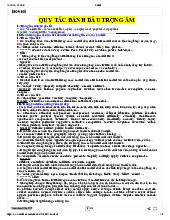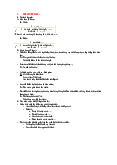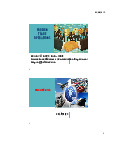

Preview text:
I.
How does Firewall justifies the 'needs to know' principle, explain?
Here's how a firewall aligns with the "need to know" principle:
1. Access Control: Firewalls enforce access control policies that determine
which network traffic is allowed to pass through based on predefined rules. By
filtering incoming and outgoing traffic, firewalls ensure that only authorized
users and devices can access specific resources or services on the network.
2. Segmentation: Firewalls can segment a network into different security zones
or segments, such as internal networks, DMZs (demilitarized zones), and
external networks. By controlling the flow of traffic between these segments,
firewalls limit the exposure of sensitive information and resources to unauthorized users.
3. Application Control: Firewalls can also control access to specific applications
or services based on predefined rules. This helps organizations restrict access to
applications that are not essential for business operations or that pose security risks.
4. Monitoring and Logging: Firewalls provide visibility into network traffic by
logging and monitoring all incoming and outgoing connections. This allows
organizations to track access attempts, identify potential security threats, and
investigate any unauthorized access incidents based on the principle of "need to know." II.
Virtual Private network is a strong candidate against infosec attack, how does it safeguards systems?
1. Encryption: One of the key features of a VPN is encryption. VPNs encrypt
data transmitted between the user's device and the VPN server, making it
difficult for hackers to intercept and decipher the information. This
encryption ensures that sensitive data remains secure during transmission
over untrusted networks, such as public Wi-Fi hotspots.
2. Data Integrity: VPNs use protocols like IPsec (Internet Protocol Security)
and SSL/TLS (Secure Sockets Layer/Transport Layer Security) to ensure
data integrity. By verifying that data has not been altered during transit,
VPNs help prevent tampering with sensitive information.
3. Anonymity and Privacy: VPNs mask the user's IP address by routing their
internet traffic through remote servers. This helps protect user privacy and
anonymity online by making it harder for third parties to track their online
activities or identify their physical location.
4. Access Control: VPNs can restrict access to sensitive resources based on
user authentication and authorization mechanisms. By implementing access
control policies, VPNs ensure that only authorized users with valid
credentials can access specific network resources.
5. Secure Remote Access: VPNs enable secure remote access to corporate
networks for employees working from remote locations. By establishing
encrypted connections, VPNs ensure that remote workers can access
company resources securely without compromising sensitive data.
6. Protection against Man-in-the-Middle Attacks: VPNs protect against Man-
in-the-Middle (MitM) attacks by encrypting data transmitted between the
user's device and the VPN server. This prevents attackers from intercepting
and eavesdropping on communication channels.




